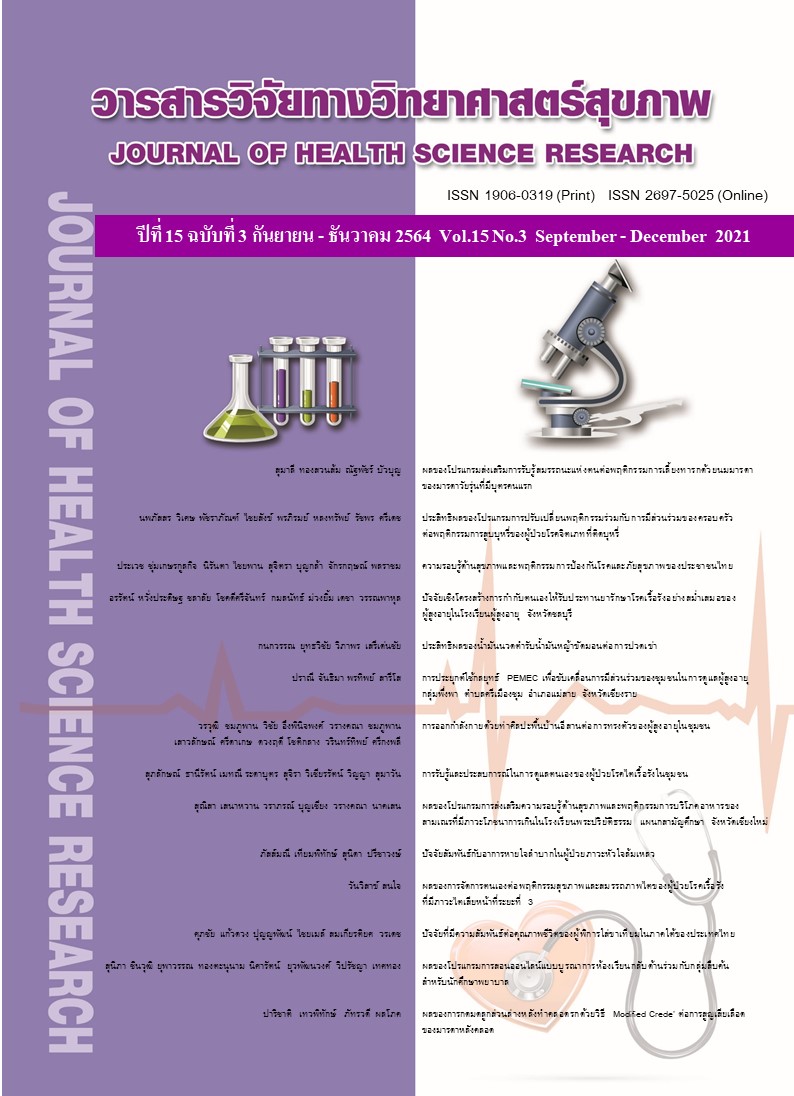การรับรู้และประสบการณ์ในการดูแลตนเองของผู้ป่วยโรคไตเรื้อรังในชุมชน
Main Article Content
บทคัดย่อ
บทนำ : การรับรู้และประสบการณ์ในการดูแลตนเองของผู้ป่วยโรคไตเรื้อรัง เป็นข้อมูลสำคัญในการดูแลและช่วยเหลือเพื่อชะลอความเสื่อมของไตในผู้ป่วยโรคไตเรื้อรัง
วัตถุประสงค์การวิจัย : เพื่อศึกษาความหมายของโรคไตเรื้อรังและการป่วยเป็นโรคไตเรื้อรังตามการรับรู้ของผู้ป่วยโรคไตเรื้อรังในชุมชน และเพื่อศึกษาการรับรู้และประสบการณ์ในการดูแลตนเองของผู้ป่วยโรคไตเรื้อรังในชุมชน
วิธีการวิจัย : การวิจัยเชิงคุณภาพแบบปรากฏการณ์วิทยา เก็บรวบรวมข้อมูลโดยการสัมภาษณ์เจาะลึกรายบุคคลผู้ป่วยโรคไตเรื้อรัง จำนวน 16 คน คัดเลือกผู้ให้ข้อมูลแบบเจาะจง และวิเคราะห์ข้อมูลเชิงคุณภาพตามวิธีของ Giorgi
ผลการวิจัย : ความหมายของโรคไตเรื้อรังตามการรับรู้ของผู้ป่วย คือ โรคที่เกิดจากการสะสมของยาที่ไตทำให้ไตสูญเสียหน้าที่ ต้องรักษาด้วยการล้างไตและสุดท้ายต้องเสียชีวิต และผู้ป่วยรับรู้การป่วยเป็นโรคไตเรื้อรังจากผลการตรวจเลือดหรือแพทย์แจ้งให้ทราบ สำหรับการรับรู้และประสบการณ์ในการดูแลตนเองของผู้ป่วยโรคไตเรื้อรัง สรุปได้เป็น 5 ประเด็นหลัก ดังนี้ 1) สาเหตุของการเกิดโรคไตเรื้อรัง
2) ผลกระทบต่อการดำเนินชีวิต 3) การดูแลตนเองของผู้ป่วยโรคไตเรื้อรัง 4) ความคาดหวังขณะป่วยเป็นโรคไตเรื้อรัง และ 5) การดูแลช่วยเหลือด้านสุขภาพ
สรุปผล : ผู้ป่วยรับรู้ความหมายของโรค การป่วยเป็นโรคไตเรื้อรัง และมีประสบการณ์ในการดูแลตนเองทั้งด้านบวกและด้านลบ จึงควรสร้างการรับรู้เกี่ยวกับโรคไตเรื้อรังที่ถูกต้องให้กับผู้ป่วย และสนับสนุนให้ผู้ป่วยดูแลตนเองอย่างเหมาะสม เพื่อลดความก้าวหน้าของโรค
Downloads
Article Details
บทความที่ได้รับการตีพิมพ์เป็นลิขสิทธิ์ของวิทยาลัยพยาบาลบรมราชชนนี จังหวัดนนทบุรี
ข้อความที่ปรากฏในบทความแต่ละเรื่องในวารสารวิชาการเล่มนี้เป็นความคิดเห็นส่วนตัวของผู้เขียนแต่ละท่านไม่เกี่ยวข้องกับวิทยาลัยพยาบาลบรมราชชนนี จังหวัดนนทบุรี และคณาจารย์ท่านอื่น ในวิทยาลัยฯ แต่อย่างใด ความรับผิดชอบองค์ประกอบทั้งหมดของบทความแต่ละเรื่องเป็นของผู้เขียนแต่ละท่าน หากมีความผิดพลาดใด ๆ ผู้เขียนแต่ละท่านจะรับผิดชอบบทความของตนเองแต่ผู้เดียว
เอกสารอ้างอิง
Cockwell P, Fisher LA. The global burden of chronic kidney disease. Lancet. 2020; 395(10225):662-4. doi:10.1016/S0140-6736(19)32977-0.
GBD Chronic Kidney Disease Collaboration. Global, regional, and national burden of chronic kidney disease,1990–2017: A systematic analysis for the global burden of disease study 2017. Lancet. 2020;395(10225):709-33. doi:10.1016/S01406736(20)30045-3.
Thai Health Promotion Foundation. Thai people are addicted to salt. It's time to join forces. "Reduce salt can be done". [Internet]. 2020 [cited 2021 Jan 16]; Available from: https://www.thaihealth.or.th/Content/534 41.html.
Avihingsanon Y, Kittiskulnam P. A complete guide to preventing and caring for kidney disease patients. Bangkok: Amarin Health; 2018. (in Thai).
Kantachuvesiri S, Chancharoenthana W, Kiattisunthorn K, Kochasenee P, Chailimpamontree W, Trakarnvanich T. Chronic kidney disesae textbook. 2nd. Bangkok: Text and Journal Publication; 2019. (in Thai).
Ammirati AL. Chronic kidney disease. Rev Assoc Med Bras. 2020;66(Suppl1):s03-9.
doi: 10.1590/1806-9282.66.S1.3.
Nonthaburi Provincial Public Health Office. Illness with important non-communicable diseases. [Internet]. 2020. [cited 2020 Nov 1]; Available from: https://hdcservice.moph.go. th/hdc/main/index.php.
Stapleton TJ. Husserl and Heidegger: The Question of a Phenomenological Beginning. New York: State University of New York Press; 1983.
Rosenstock IM, Strecher VJ, Becker MH. Social learning theory and the health belief model. Health Educ Q. 1988;15(2):175–83. doi. 10.1177/10901981880150020310.
Giorgi A. Phenomenology and psychological research. Pittsburgh, Pennsylvania: Duquesne University Press; 1985.
Wright HH, Kickbusch H, Swanepoel E, Gray N. Factors influencing low sodium intake in people with non‐dialysis dependent chronic kidney disease. J Ren Care. 2020;46(2):95–105. doi: 10.1111/jorc.12311.
Stavropoulou A. Rovithis M, Grammatikopoulou MG, Kyriakidi K, Pylarinou A, Markaki AG.
Exploring patients’ experiences after chronic kidney disease diagnosis: A qualitative study. Nephrol Nurs J. 2020;47(1):67–98. doi: 10.37526/ 1526-744X.2020.47.1.67.
Pedreira Robles G, Aguayo-Gonzalez MP. From physical to emotional pain in chronic kidney disease: Nurses’ perceptions. J Ren Care. 2019;45(4):212–22. doi: 10.1111/jorc.12302.
McKillop G, Joy J. Patients’ experience and perceptions of polypharmacy in chronic kidney disease and its impact on adherent behaviour. J Ren Care. 2013;39(4):200–7. doi: 10.1111/j.1755-6686.2013.12037.x.
Agustiyowati THR. Knowledge and attitude toward chronic kidney disease among pre- dialysis patients in Indonesia. Int. J. Caring Sci. 2020;13(1):283–7.
Zhang J, Bennett PN. The perception of people with chronic kidney disease towards exercise and physical activity: a literature review. Ren. Soc. Australas J. 2019;15(3):97–104. doi. 10.33235/rsaj.5.3. 97-104.
Cargnin MCS, Santos KS, Getelina CO, Andriana R, Paula SF, Ventura J. Patients undergoing hemodialysis: perception of changes and constraints regarding the kidneydisease and its treatment. J Res Fundam. Care. Online. 2018;10(4):926–31. doi: 10.978 9/2175-5361.2018.v10i4.926-931.


